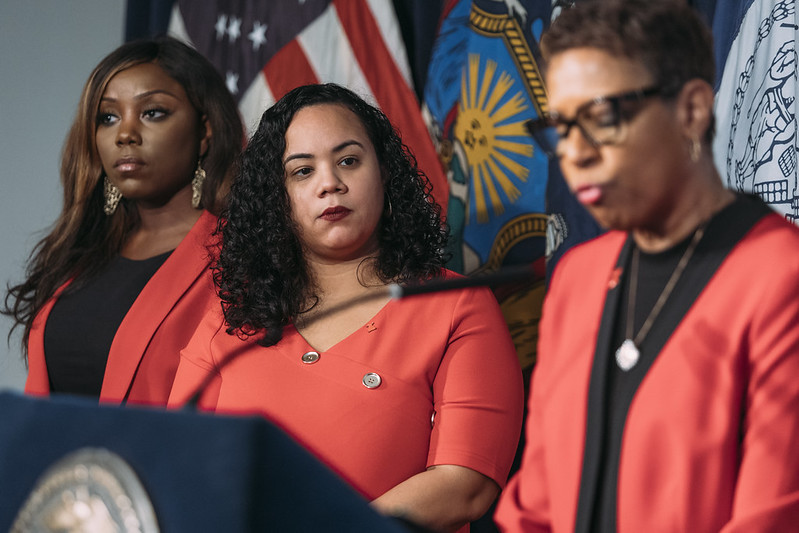
City Council Members Louis, left, & De La Rosa, center - the authors (photo: Emil Cohen/NYC Council)
Our first women-majority New York City Council continues to make strides towards addressing critical inequities and disparities in the largest municipal workforce in the United States. The Council took an important step in addressing pay inequities in the municipal workforce with the recent passage of three bills. This legislative package aims to address pay disparities, occupational segregation, and the diversification and retention of city workers. Together, they will help to address many challenges impacting women and people of color in New York City.
These are real issues in New York City’s municipal workforce, just as they are across sectors and localities. In 2019, the City Council passed Local Law 18 (LL18) and began collecting and analyzing pay data across race and gender lines. Analysis from that data exposed troubling trends.
The City’s female employees make just 73 cents to the dollar made by their male colleagues. Black male employees of city government make 79 cents for every dollar made by their white counterparts. And, appallingly, Black women make just 69 cents on the dollar when compared with white male employees.
Furthermore, the analysis showed that occupational segregation is the driving force of these pay inequities. In other words, certain races, ethnicities, and genders are concentrated in specific positions within city government, and those roles are compensated differently than jobs filled by different demographics of employees.
In New York City, our government workers have carried us through the storm of COVID-19. We told them they were essential while we counted on them to drive our buses, clean our streets, distribute benefits, and keep our city running. We are currently facing severe government worker vacancies, with key agencies operating with skeleton staff, leading to challenges in New Yorkers receiving food stamps, cash assistance benefits, and other services. This is unacceptable — both for city workers, as well as for vulnerable New Yorkers who depend on these benefits to survive, and all of us who call this city home.
An oversight hearing last September addressed these vacancies in city agencies and accessibility to municipal jobs, and led to the passage of Local Law 02 of 2023. This law established the civil service ambassador program, aiming to bring awareness and additional educational support for the examination process required for 80% of municipal jobs and to reduce the approximately 8% citywide vacancy rate.
Based on the September 2022 Pay Equity Report, pay gaps decrease among employees who share the same civil service title, reaffirming that amplification of the civil service exam provides a clear pathway to close the pay equity gap within the municipal workforce. The ambassador program goes further to promote the civil service exam in non-traditional outreach locations such as high schools, juvenile justice facilities, foster care programs, shelters, and social work programs.
Government jobs can provide an important source of stability, growth, and opportunity for New Yorkers, especially for traditionally underserved communities. But these jobs must be distributed equitably. Workers of color must be afforded the same pay, benefits, and job opportunities as their white, male colleagues. And a fully staffed workforce is essential to providing the services and support New Yorkers depend on. These newly-passed bills represent a pay equity package that aims to address these issues from different, but related vantage points.
The Pay Equity Package seeks to provide the additional data collection, reporting, and analysis necessary to build on the foundation set by LL18 and LL02. Collectively, they look at the whole funnel of government employment, from the civil service exam process to recruiting and retention to terminations and resignations. They also remove some of the restrictions LL18 put in place that hindered analysis, and they dig deeper into the departments that are most segregated by race and gender. Together, they provide the City Council with the tools it needs to act on the disparities exposed by LL18.
Pay equity and a diverse workforce are the cornerstones of a just society. Without them, employees face unequal opportunity that harms them, their families, and our communities. The four years since LL18 was passed have shown us the importance of collecting the data to illuminate key trends. It was the first step towards addressing pay inequity and providing equal opportunities for city workers. But it didn’t go far enough.
These new policies take action on what we learned from that initial data. They send a strong message that we are prioritizing pay equity and a diverse workforce as our path to economic recovery and resilience. They bring New York City one step closer to its goal of being a place where people can live, work, and thrive equally. Our new majority will continue to lead the way in ensuring New York City is an equitable workplace for all.
***
City Council Members Farah Louis (District 45) and Carmen De La Rosa (District 10) represent parts of Brooklyn and Manhattan, respectively. On Twitter @CMFarahLouis & @CnDelarosa.
***
Have an op-ed idea or submission for Gotham Gazette? Email This email address is being protected from spambots. You need JavaScript enabled to view it.




